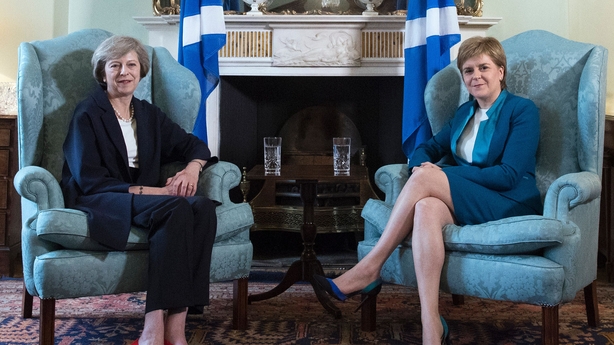Scotland's First Minister Nicola Sturgeon said she would not rule out the possibility of Scotland remaining in the European Union as well as part of Britain in the wake of the Brexit vote.
"I don't think that should be ruled out at this stage," she said, adding that the EU's attitude to Scotland's place in Europe has softened since the result.
The UK backed Brexit overall in the 23 June referendum mainly due to voters in England and Wales, but voters in Scotland heavily backed remaining part of the EU.
Ms Sturgeon met new Prime Minister Theresa May for the first time in Edinburgh on Friday, with Ms May aiming to show her commitment to preserving the United Kingdom.

The First Minister has said a second referendum on Scottish independence is now highly likely because of the poll results north of the border.
Speaking after the meeting, the Prime Minister said she will not trigger Article 50 - the formal mechanism for leaving the EU, which starts two years of negotiations - until she thinks "we have a UK approach and objectives".
Asked if Ms May had given her a veto over triggering Article 50, Ms Sturgeon told the BBC: "That certainly appeared to be an interpretation that some put on the Prime Minister's remarks after the meeting... and certainly from what she said after the meeting, I think that puts Scotland in a very, very strong position.
"That's a position I am going to use as well as I can."
Ms Sturgeon has set up an expert group to look at the options for protecting Scotland's place in Europe.
She said it could be possible to find a solution where Scotland remains in the EU and the UK, while the rest of the country leaves the EU - a move Scottish Secretary David Mundell has described as fanciful.
She said: "My position is there might be. We're in uncharted territory, and when you are in uncharted territory with effectively a blank sheet of paper in front of you, then you have the opportunity to try to think things that might have previously been unthinkable and shape the future.
"I think there are opportunities. The positive outcome of the meeting I had with the Prime Minister on Friday was that she said she was prepared to listen to options the Scottish Government would bring forward to give effect to how Scotland voted and we will certainly bring forward options."
Her comments contradict remarks by some EU leaders, including Spanish Prime Minister Mariano Rajoy, who have suggested that if the UK leaves, Scotland leaves too.
But the First Minister, who met with key EU figures during a trip to Brussels after the referendum, said Europe's attitude to Scotland has changed since the 2014 independence referendum.
Asked if the EU may put aside its own rules and act politically to keep Scotland in, she said: "I do think that mood is there, and what I encountered in Brussels was a warmth, an openness, a great sympathy to the position that Scotland finds itself in.
"Things have changed fundamentally."

